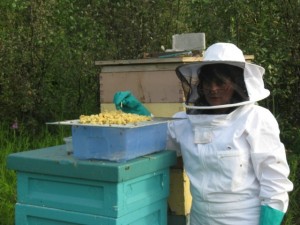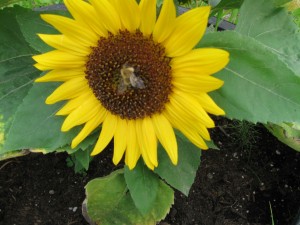Honey brings sweetness to life
March 20, 2012
907-474-5042
3/20/12
The buzz in Debra Tate’s head is all about the healthy attributes of honey.
Her interest in beekeeping began four years ago with fear and trepidation and has since grown into a life passion.
Tate, owner of Queen’s Way Apiaries, was taking a Master Gardener course when a classmate suggested she get some beehives. “I was terrified, not of the bees but of something new. I was afraid it would not be successful,” Tate said. “That first year I didn’t know what I was doing but the second year I did OK.”

In the spring of 2009 Tate bought two hives and lost the queen in one of them. Her mentor, Steve Petersen, asked her how she knew the queen was gone and she said she could tell by the sound. The queen has a visible dot and Tate didn’t see that particular bee anymore and she noticed the bees were moving to the other hive. Petersen acknowledged all her points and said she had learned a lot in his class.
That first year, Tate got five gallons of honey, then bought two more hives from Petersen. Her hives are made of foam, not wood, and Tate just loves them. She also prefers the Italian type of bee because they are not mean and they produce a lot of honey.
Tate hails from Haines and has also lived in Juneau. She has been in North Pole for 18 years, coming here to make a life change and attend college for a while. At the time she had three young children and decided to focus on them. Since moving to the Interior she has taken up gardening with a vengeance. On her three acres she raises chickens, turkeys, tomatoes, peppers, cucumbers, strawberries, zucchini, lettuce, spinach, herbs, broccoli, cauliflower, cabbage, potatoes, Brussels sprouts, carrots and beets. She has noticed since she took up beekeeping that the garden does much better, due to the pollination factor.
“North Pole is the perfect place for honeybees,” she said.
This summer she will have 10 hives, with her new colonies arriving in April. At the end of the season the bees are destroyed, which Tate said is the hardest part of beekeeping.
She admits all the work would not be possible without help due to chronic pain she has from a work injury to her wrist. Through exercising at the Alaska Club she met a young friend and UAF student, Joel Carpenter, who helps her with the manual labor in exchange for honey.

The honey she harvests is raw, hence her slogan, “Honey in the Buff.” She firmly believes in the medicinal use of raw honey and swears by the book, “The Honey Revolution” by Ron Fessenden and Mike McInnes. She takes two teaspoons of honey at bedtime every night to help with her liver function and to promote restful sleep. Tate even believes that honey can aid people with diabetes and Alzheimer’s disease. “It is the only complete food and the only food that never spoils,” she said.
She typically doesn’t cook with honey because heat destroys its enzymes but she does use it in her homemade granola. A new twist in the medicinal aspects will be tackled this year when she tries bee sting therapy to help relieve her pain. “I’m learning through trial and error,” she said.
“Honeybees are fascinating,” Tate said. “It’s amazing to watch how they work together in the hive. The queen has her job. The worker bees, all female, go through six things in their short lives. They instinctively know what to do.” She is also interested in how the color and taste of the honey changes as the season does. In the spring the honey is flavored with willows and birch, later in the summer with dandelions and then by the end of summer with clover and fireweed. And she loves the aroma of the hives. “It smells like heaven,” she said.
Tate enjoys sharing her knowledge with others and often invites visitors to her place so they can see the hives.
To be successful at beekeeping you have to be committed, Tate said. “You have to know how to read the hive.”

She said she never dreamed in a million years she would be doing this but now she is hooked. “It’s fascinating,” she said. So far she doesn’t sell honey, just gives it away to friends. “We have to start out the way we are meant to go,” she said. “I want it to be solid and successful.
“This is more of a journey than a business,” she said. “This is my life’s journey. If you have a dream that is bigger than you are then it’s from God.”
This column is provided as a service by the UAF School of Natural Resources and Agricultural Sciences and the Agricultural and Forestry Experiment Station.


